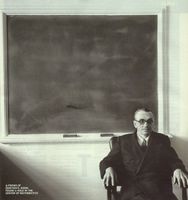 Now that we've created this idea of a formal system as a way of creating and defining math we need to do 2 additional things. And they are quite amazing things to try to accomplish. First, we need to make sure that the formal system is complete. Meaning we need to make sure the formal system can create theorems of all arithmetic truths. Again, all arithmetic proofs can be created from our formal system. Second, we need to make sure it doesn't create any contradictions. It can't prove that 1+1=2 and 1+1=3.
Now that we've created this idea of a formal system as a way of creating and defining math we need to do 2 additional things. And they are quite amazing things to try to accomplish. First, we need to make sure that the formal system is complete. Meaning we need to make sure the formal system can create theorems of all arithmetic truths. Again, all arithmetic proofs can be created from our formal system. Second, we need to make sure it doesn't create any contradictions. It can't prove that 1+1=2 and 1+1=3.How do we do this? We create theorems that prove these 2 things are true. If you think about that, it's an amazingly hard sounding task. We are going to use a formal system to prove that the formal system can prove all theorems in the formal system and prove that it won't create any contradictory theorems. The clouds of self-referencing are starting to stir with those 2 tasks.
However that was the task set out by Hilbert. Oddly enough, formal systems for most other major areas of math had been created and been proved to be non-contradictory and complete. Except for one small problem. They all depended on the proof of arithmetic self-consistency and completeness. Once that was done you could slip that proof into these other proofs and you're basically done. And let me make this clear. No one... no one thought this couldn't be done. Every mathematician thought it was inevitable that this was true. It just couldn't be that formal systems would be unable to unearth a proof of all mathematical statements or that they would create contradictory theorems. It was just a matter of being complete and proving it to be the case.
I found the story of how Godel actually 'unleashed' his theorem onto the world quite fitting. Godel is by all accounts a very quiet, precise, and anti-climatic man. One great quote from him is along the lines of
the more I think about language, the more it amazes me that people ever understand each otherReminds me of a quote from Sartre's play, No Exit. He preferred to let his math do that talking. It should come as no surprise that his 'unveiling' of the theorem is quite shocking in it's lack of pomp and circumstance. He didn't present, rather than just make one comment during a roundtable at a mathematics conference. This is it:
One can even find examples of propositions which are really contextually true but unprovable in the formal system of mathematicsIt's not clear anyone even noticed. Or perhaps people heard the comment but thought to themselves, 'that couldn't be what he meant' and moved on. At a conference full of the leading mathematicians, only one understood what Godel had said. That was Von Neumann, attesting to his greatness as a mathematician. Without his recognition it may have taken many more years for Godel's theorem to sink in. But what did Godel really say? It's clearly a very purposefully stated sentence. One that Godel perhaps spent a long time writing in his head. It is sparse in it's statement. There's no embellishment and no superfluous words added to it. Here's what it means. And it's best done by quoting an expertly crafted make-believe paragraph from the book. It's from the voice of another mathematician at the conference and what they should have said after Godel popped his little quip.
I thought you just said that you'd proved the existence of unprovable arithmetical truths. Of course, you couldn't have been saying that because, [that would fly] in the face of all our views on the nature of mathematical truth, that sounds like a contradiction in terms. How could you prove that there are arithmetical propositions that are both unprovable and true? Wouldn't that proof, in showing them to be true, constitute a proof of them, thus contradicting your claim that the proof proves them unprovable?Italics are mine. It shows that what Godel had said is seemingly impossible. He's saying that he has proven that there exists a theorem that is true but you can't prove it. If you can prove that a theorem is true then how can it be that the theorem is not provable? How can you ever say something is provable without proving it. It doesn't make any sense?
That in a nutshell is the genius of Godel. That he could even do this and had the foresight to think of a way to prove something that is seemingly a dead end goal. The way he was able to accomplish this was by making a self referential statement in mathematics. The oft used analogue in language is this statement,
This sentence is falseThat statement is neither true or false. If the sentence is true then it is telling you it is false. And vice versa. It simply doesn't make sense. We will see how Godel was able to use this idea of self referencing to make his bizarre statement.

No comments:
Post a Comment